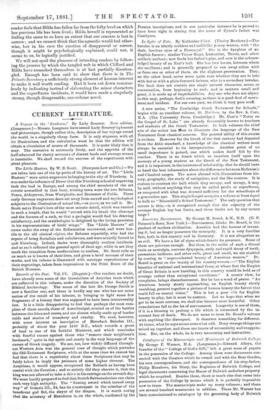Records of the Fast. Vol. IX. (Bagster.)—Our readers, no doubt,
have already seen some of the translations of Assyrian texts which are collected in this volume, under the direction of the Society of Biblical Archteology. The name of the late Mr. George Smith is now a familiar ono, and there is hardly any one who has not some notion of the result of his labours, in bringing to light some few fragments of a history that was supposed to have been irrecoverably lost. It is a little disappointing to find that perhaps the most com- plete of these annals, those of Assurbanipal, remind us of the battles between the kites and crows, and are almost wholly made up of border raids and stories of treachery and cruelty. We read, however, with some interest an inscription of Merodach Baladan III., probably of about the year 1340 B.C., which records a grant of land to one of his faithful Ministers, and which concludes with fearful curses against those who "remove their neighbour's landmark," quite in the spirit and nearly in the very language of the nurses of Greek tragedy. We see, too, how widely diffused through- out Western Asia was the general tone of thought which pervades the Old-Testament Scriptures, while at the same time we cannot but feel that there is a superiority about these Scriptures that may be fairly taken to imply the presence of some higher element. The Assyrians, it would appear, recognised the Sabbath as having been coeval with the Creation ; and so strictly did they observe it, that the king was not allowed to take a drive in his carriage on the seventh day. We were hardly prepared to find that Scotch Sabbatarianism can claim such very high antiquity. The "flaming sword which turned every way" of Genesis III., 24, has its counterpart in the scimitar of the beneficent god Bel, the slayer of the dragon. It is worth noting that the accuracy of Herodotus is, on the whole, confirmed by the
Persian inscriptions, and in one particular instance le is proved to have been right in stating that the name of Cyrus's father was Cambyses.






























 Previous page
Previous page